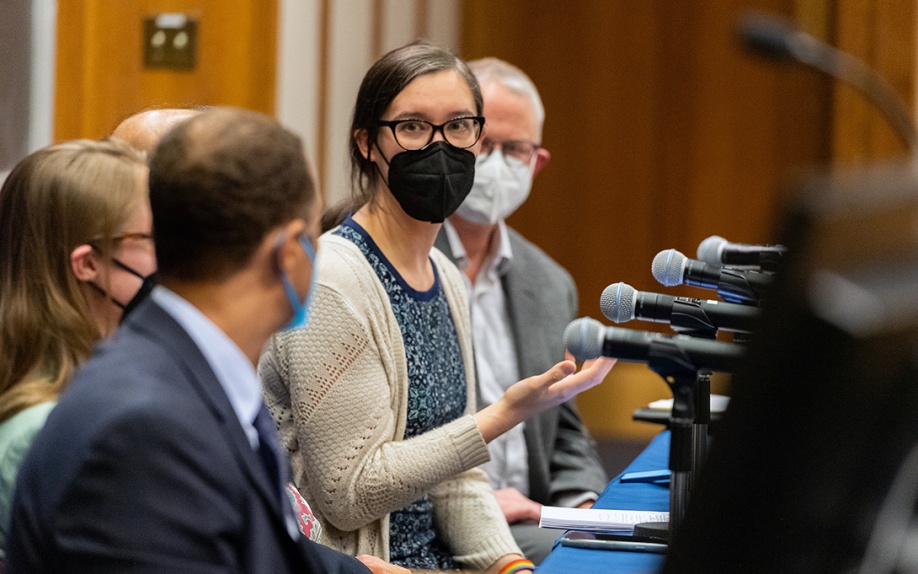Public Interest Technology oriented programs and initiatives at Michigan include:
-
The Digital Studies Institute, housed in the College of Language, Science and the Arts, provides space for scholars in the humanities and qualitative social sciences who are experts on digital studies and supports their research and teaching. It is the nation's first one-stop shop for all things digital, including digital media studies, digital humanities, digital pedagogy, digital art, aesthetic practice and design, and critical thinking about our digital future. Digital Studies is a big tent that has always included practitioners, critics, theorists, and artists. DSI also a national leader in the study of digital media and race, gender, and identity.
The ESC key was added to the computer keyboard to interrupt a program when it produced unwanted results, allowing the system to be critically examined. In the same way, the Center for Ethics, Society, and Computing (ESC – pronounced “escape”) is dedicated to intervening when digital media and computing technologies reproduce inequality, exclusion, corruption, deception, racism, or sexism. ESC is a research center and a collective of scholars committed to feminist, justice-focused, inclusive, and interdisciplinary approaches to computing. It is based in the School of Information and will officially launch in Fall 2019.
Bringing underrepresented lived experiences under the spotlight, the PIT Knowledge Network is aimed at ensuring balanced and inclusive solutions in the field of Public Interest Technology.
Innovation in Action harnesses the talents and passions of Michigan students to address society's biggest problems. Innovation in Action provides a supportive community in which students of any discipline come together to develop an innovator's toolkit for tackling real-world challenges. Through the course of this 5-month experience, students do a deep dive into a problem space and come out the other side with robust insights about complex issues, and the tools to synthesize that data and turn it into a solution.
The Graduate Certificate in Urban Informatics, housed in the Taubman College of Architecture and Urban Planning, introduces not only technical skills for technology development and data analysis, but also offers opportunities to explore the ethical, legal, and policy questions created by new urban technologies.
The Center for Social Media Responsibility addresses the negative effects of broad access to the means of public communication, while amplifying positive effects. Broad access to public communication has had unintended consequences: harassment; a credibility vacuum; a race to the bottom in the competition for attention; a triumph of mobilization within echo chambers over persuasion across political fault lines. Technologists at social media companies (product managers, designers, and engineers) are the day to day policy makers of today's social media landscape. The Center for Social Media Responsibility (CSMR) articulates principles and creates metrics and tools that empower technologists to set responsible policy.
Faculty at U-M’s School of Information work on the front lines of public interest technology. Current research projects include those that investigate ways that technology may alleviate food deserts and detect online hate speech.
This course aims to create information tools that support 21st-century citizenship. This is a project-based, experiential learning course where students apply their skills to create information products in partnership with a Michigan community. Students will work with partners in Michigan communities to deliver information tools and services that foster an engaged citizenry. Students will work in teams, travel to the partner community, and have support of administrative staff to manage projects.
PITH2O is a collaboration between, Rebecca Hardin, an associate professor at U-M’s School for Environment and Sustainability (SEAS), Lutgarde Raskin, a professor at U-M’s College of Engineering, SEAS professor Kyle Whyte, and partners from the City of Ann arbor, the BlueConduit startup, and U-M’s Blue Sky Initiative for water sector engagement. Building on the doctoral research of U-M student Matt Vedrin, with support from the National Science Foundation-funded Midwest Big Data Hub, the project uses U-M’s homegrown open source/open access learning platform learngala.com for data-rich learning tools to make responsive low-barrier-to-use learning tools created for classrooms, communities and workforces facing challenges in the monitoring and improvement of quality drinking water distribution systems.
For more information and to add your work to our site, contact [email protected].

